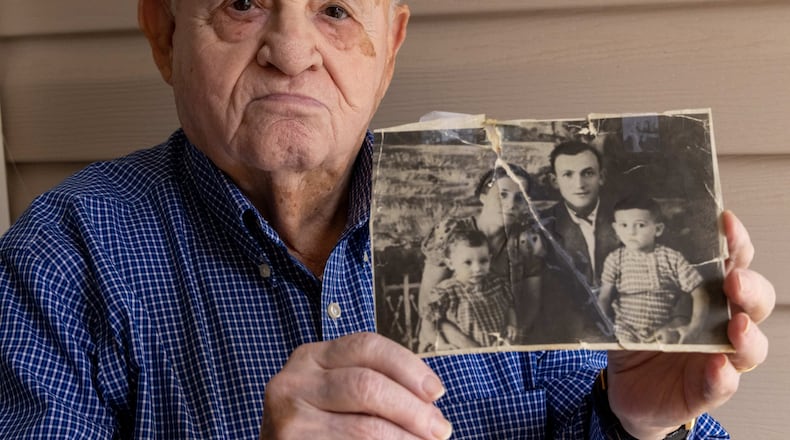Holocaust survivor and longtime Atlantan Hershel Greenblat spent the first year of his life in underground caves in Ukraine. His parents were part of a resistance group hiding from the Nazis and the Russian police during World War II.
That’s what his mother always told him. His early memories begin after the family escaped and eventually made it to America.
Greenblat was 8 years old when he arrived in Atlanta in 1950. The Jewish immigrant family of five settled in an apartment on Capitol Avenue. Greenblat entered third grade not knowing English. But his teacher, Frances Zaglin, helped him catch up to his peers and become an all-American boy. She even took him to Rich’s Department Store downtown and purchased his first two pairs of Levi’s.
When Greenblat graduated from the former Grady High School in 1960, most of his classmates had no idea of his family’s Holocaust survival. He had only told his two best buddies.
“When I was at home in the middle of the night and went to the bathroom, I could hear my mother and father crying,” Greenblat said. “When I got to school, I just did not want to talk about it. I wanted to be a typical American teenager.”
Now that he is 81 and a great-grandfather, Greenblat is passionate about sharing his family’s story to persuade a younger generation to stand against hatred, especially in the face of growing antisemitism.
Because of hatred, “the rest of the world stood by and watched one atrocious human being put together one of the worst atrocities in world history,” he said. “I want to teach them why it happened, so it doesn’t happen again.”
The Holocaust was the systematic persecution and murder of 6 million European Jews and others by the Nazi German regime and its allies during World War II.
Greenblat is retired from a sales career and has been married to his wife Rochelle for 58 years. They have two sons, four grandchildren and one great-grandson.
Greenblat tells his story on college campuses around the country and has been a regular speaker for the past nine years at the Breman Museum, a Jewish culture and history center on Spring Street.
He will be speaking for Bearing Witness, a Breman program featuring Holocaust survivors and their families, on Jan. 15 from 2 to 3 p.m. at the museum.
Credit: Phil Skinner
Credit: Phil Skinner
Greenblat’s story “puts a face to that big story that helps all of our visitors understand the human price of the Holocaust,” said Rabbi Joseph Prass, director of Breman’s Weinberg Center for Holocaust Education.
“As time marches on, we have fewer and fewer survivors who witnessed the Holocaust. Hershel was a witness,” Prass said. “He saw the aftermath of the Holocaust, and it’s powerful to have him be able to tell the story himself.”
Greenblat’s story begins in the Ukraine caves, with his father sneaking out at night to get food and supplies. Once, his mother was hit by shrapnel from an exploding vehicle, and he was left in the care of other families for eight weeks while his parents sought medical care. His mother never fully recovered from her injuries.
After the family left the caves, there were more years of hiding and sleeping on basement floors in the homes of strangers. His father even spent a few years in a Russian prison camp after stealing bread to feed his family.
Greenblat’s earliest clear memory was escaping after the war ended. His family and about 200 other people crammed onto two cattle cars and headed for a displaced persons camp in Austria. They traveled at night and ate raw vegetables plucked from nearby farms. Once they arrived, American soldiers greeted them warmly, even though they were covered in lice, roaches and human feces.
“The love I felt from those American soldiers is difficult to describe,” remembered Greenblat. “Kids were given boxes and boxes of Hersey bars.”
His mother wanted them to immigrate to Israel, but that would have taken too long, so they left for America instead, setting sail in November of 1950. Greenblat remembers as an 8-year-old standing by the ship rails on Thanksgiving morning and seeing the Statue of Liberty for the first time.
“People were crying, dancing and laughing,” he said.
It wasn’t always that joyous for the Greenblats of Atlanta. His father eventually bought a small neighborhood grocery store in the Buttermilk Bottom area of central Atlanta and poured himself into the community. His mother was a stay-at-home mom, still in constant pain and relying on crutches to walk. They never talked of their past travails or of their extended families who did not survive the Holocaust.
“My father suffered a deep depression,” Greenblat said. “My mother was the glue that kept us together. If it weren’t for her, I wouldn’t be here – the way she hid me, begging for food, begging for shelter.”
After he tells his family’s story to groups of students, he commissions them to love and respect their teachers, parents and each other.
“If you see someone who needs a friend, be a friend,” he tells them. “And don’t be a bystander. The world stood by and let it happen. The United States stood by, everybody stood by, and let it happen.”
MORE DETAILS
Bearing Witness: Unforgettable Stories from the Holocaust. With Hershel Greenblat, guest speaker. Sunday, Jan. 15, 2-3 p.m. Free, but online registration is strongly advised. Breman Museum. 1440 Spring St. NW, Atlanta. thebreman.org
About the Author
Keep Reading
The Latest
Featured



